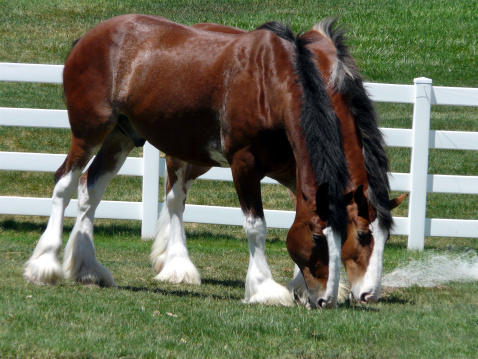Draft Horse Nutrition – Feeding the Gentle Giants

The Belgian, Clydesdale, Percheron, Shire and Suffolk breeds are the primary draft horse breeds in the U.S. The breeds are named for their country or area of origin. The Belgians originated in the Belgium, the Clydesdales originated in the river Clyde district of Scotland, the Percherons originated in the Perche region of France, the Shires originated in the east of England and the Suffolk originated in the counties of Norwich and Suffolk in England. They were originally imported to the U.S. for true horsepower and are now very popular for shows, pulling competitions, parades and work. The commercials and advertising associated with the Clydesdales have made that breed one of the most recognized of the draft breeds.
Key Criteria for Raising and Using Draft Horses
Draft horses are large, heavy muscled animals that are relatively slow to mature and are metabolically very efficient. Mature horses will weigh anywhere from 1500 lbs to well over 2000 lbs. Hoof quality, bone strength, muscle development and hair coat are all key criteria that are important in raising and using draft horses. As draft horses perform work, energy requirements increase substantially.
Draft Horse Nutrition: Importance of Forages and Balanced Grain Mixtures
Good quality forages, grass or grass/legume mixtures, are an important part of the draft horse diet. Horses will consume 1.5-2.5% of bodyweight in forage. Properly balanced grain mixtures, pelleted or textured, may be used to provide the additional energy, amino acids, minerals, trace minerals and vitamins to balance the diets.
Addressing Hoof Quality and Growth in Draft Horses
Poor quality hoof growth can be a problem with draft horses. The use of feeds containing biotin, zinc and methionine may be beneficial for these horses.
Equine Polysaccharide Storage Myopathy Impacted by Draft Horse Nutrition
Draft horses may also be affected by Equine Polysaccharide Storage Myopathy, which used to be called Monday Morning Disease or Azoturia. This conditions results in the horse “tying up” with stiff muscles and reluctance to move. These horses may benefit from a diet that has controlled levels of non-structural carbohydrates or soluble carbohydrates (starches and sugars) and that contains added fat from vegetable oil as well as optimum selenium and vitamin E levels. Regular exercise and turn out are also important for these horses.
Preventing Developmental Orthopedic Disease in Growing Draft Horses
Growing draft horses may also develop Developmental Orthopedic Disease problems as a result of genetics, conformation, stress or improper nutrition. Feeding a balanced diet and avoiding excess body condition score may be beneficial in reducing the risk of these problems.
Essential Care: Salt and Water for Draft Horses in Heavy Work.
Be sure to provide free choice salt and access to fresh clean water for all your draft horses, especially those who are performing heavy work.
